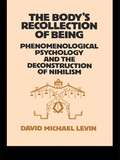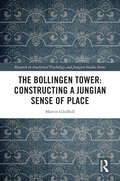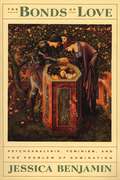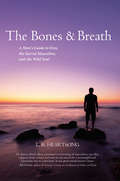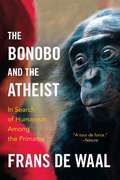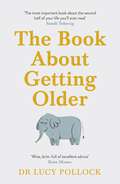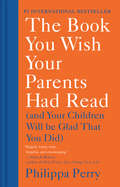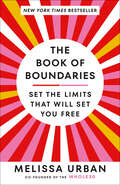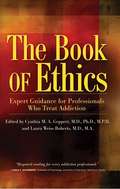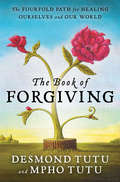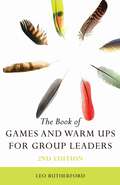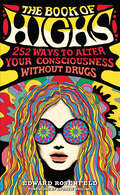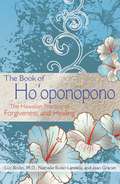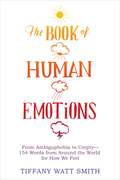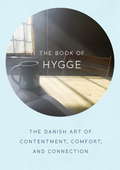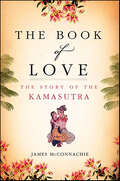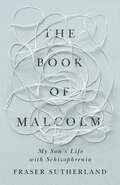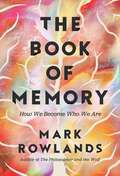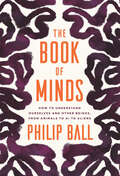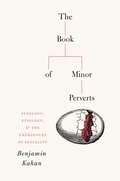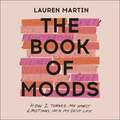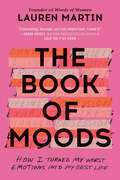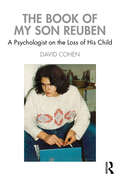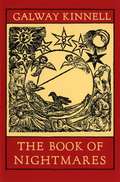- Table View
- List View
The Body's Recollection of Being: Phenomenological Psychology and the Deconstruction of Nihilism
by David Michael LevinThis is a unique study, contuining the work of Merleau-Ponty and Heidegger, and using the techniques of phenomenology against the prevailing nihilism of our culture. It expands our understanding of the human potential for spiritual self-realization by interpreting it as the developing of a bodily-felt awareness informing our gestures and movements. The author argues that a psychological focus on our experience of well-being and pathology as embodied beings contributes significantly to a historically relevant critique of ideology. It also provides an essential touchstone in experience for a fruitful individual and collective response to the danger of nihilism. Dr Levin draws on Merleau-Ponty's phenomenology to clarify Heidegger's analytic of human beings through an interpretation that focuses on our experience of being embodied. He reconstructs in modern terms the wisdom implicit in western and semitic forms of religion and philosophy, considering the work of Freud, Jung, Focault and Neitzsche, as well as that of American educational philosophers, including Dewey. In particular, he draws on the psychology of Freud and Jung to clarify our historical experience of gesture and movement and to bring to light its potential in the fulfilment of Selfhood. Throughout the book, the pathologies of the ego and its journey into Selfhood are considered in relation to the conditons of technology and the powers of nihilism.
The Bollingen Tower: Constructing a Jungian Sense of Place (Research in Analytical Psychology and Jungian Studies)
by Martin GledhillOffering a novel conceptual methodology where Jungian psychology is used to analyse Jung’s own architecture, this book offers an innovative reading of Jung’s Bollingen Tower in order to explore a Jungian sense of place, situating it within a wider examination of the psychic places that influenced his work. Representing the first comprehensive study of Jung’s building activities, the chapters illuminate the wider purpose of architecture as a reflection of self and a means to ‘belong’ in the world. Using , the author’s own fieldwork, interviews with descendants, and detailed analysis of Jung’s autobiography and copious writings drawn from his own imagination and psyche, chapters explore themes such as the relationship between psyche and geometry, the idea of psychic place, and ‘inner’ and ‘outer’ in analytical psychology. In discussing the legacy and the predominance of Bollingen Tower as the defining spatial motif of Jung’s psychological system, the chapters also cover comparisons with Marie-Louise von Franz’s Tower and Christiana Morgan’s Tower. The author’s own background as an award-winning architect, alongside a lifelong study of analytical psychology, makes him uniquely placed to shed light on this as-yet underexplored area of study. The book opens up interdisciplinary dialogues and provides a broader context for understanding the relationship between the environment and the psyche. It will therefore be of interest to scholars and postgraduate students in the fields of Jungian and analytical psychology and architecture.
The Bonds of Love: Psychoanalysis, Feminism, and the Problem of Domincation
by Jessica BenjaminWhy do people submit to authority and derive pleasure even others have over them? What is the appeal of domination and submission, and why are they so prevalent in erotic life? Why is it so difficult for men and women to meet as equals? Why, indeed, do hey continue to recapitulate the positions of master and slave?In The Bonds of Love, noted feminist theorist and psychoanalyst Jessica Benjamin explains why we accept and perpetuate relationships of domination and submission. She reveals that domination is a complex psychological process which ensnares both parties in bonds of complicity, and shows how it underlies our family life, our social institutions, and especially our sexual relations, in spite of our conscious commitment to equality and freedom.
The Bones and Breath
by L. R. HeartsongIn The Bones and Breath, Heartsong asserts that we each have an essential gift to bring to the world and through actively embodying the soul-primarily via the body and our expanded, physical senses-we undertake a profound, transpersonal journey; one that serves humanity and the Earth at a crucial phase of our collective evolution. Our life task is not to transcend the body but to become fully human by descending into the bones and breath, to there discover the gift our soul has to offer to the 'more-than-human’ world. Heartsong seeks to bring men out of their heads and down into the bodysoul, there to discover their personal authenticity as a wild soul. Eros is the key. Eros is something much more than romantic love-it is the elemental force of allurement that plays a pivotal role in our evolution as conscious beings and pulls us towards our destiny. The Sacred Masculine is an important archetype now making a much-needed return to assist humanity, as mankind shifts from being the most destructive force on the planet to a life-sustaining one. Interwoven with personal stories and seven primary Soul Skills and embodiment exercises, The Bones and Breath is "how-to" manual for a soul-centered life.
The Bonobo And The Atheist: In Search Of Humanism Among The Primates
by Frans De WaalFor many years, de Waal has observed chimpanzees soothe distressed neighbors and bonobos share their food. Now he delivers fascinating fresh evidence for the seeds of ethical behavior in primate societies that further cements the case for the biological origins of human fairness. Interweaving vivid tales from the animal kingdom with thoughtful philosophical analysis, de Waal seeks a bottom-up explanation of morality that emphasizes our connection with animals. In doing so, de Waal explores for the first time the implications of his work for our understanding of modern religion. Whatever the role of religious moral imperatives, he sees it as a "Johnny-come-lately" role that emerged only as an addition to our natural instincts for cooperation and empathy. But unlike the dogmatic neo-atheist of his book's title, de Waal does not scorn religion per se. Instead, he draws on the long tradition of humanism exemplified by the painter Hieronymus Bosch and asks reflective readers to consider these issues from a positive perspective: What role, if any, does religion play for a well-functioning society today? And where can believers and nonbelievers alike find the inspiration to lead a good life?Rich with cultural references and anecdotes of primate behavior, The Bonobo and the Atheist engagingly builds a unique argument grounded in evolutionary biology and moral philosophy. Ever a pioneering thinker, de Waal delivers a heartening and inclusive new perspective on human nature and our struggle to find purpose in our lives.
The Book About Getting Older: The essential comforting guide to ageing with wise advice for the highs and lows
by Lucy PollockThe honest, compassionate and vital guide to getting older, from dementia to finances, medication to care homes'The most important book about the second half of your life you'll ever read. I wish everyone in the UK could be under Dr Lucy's care' SANDI TOKSVIG'This warm and compassionate book gets to the heart of older age' THE BRITISH GERIATRICS SOCIETY________Now more than ever, we need to talk about getting older.Many of us are living to a very great age. But how do we give those we love, and eventually ourselves, long lives that are as happy and healthy as possible?Dr Lucy's book gives us answers to the questions we can voice - and those that we can't. This essential guide will guide you through those important conversations around growing older, answering every question you might have, including:· How do we start the conversation?· How do we ask whether it's worth taking seven different medicines?· Is it normal to find you're falling out of love with someone, as they disappear into dementia?· Should Dad be driving, and if not, who can stop him?· What are the secrets of the best care homes?· When does fierce independence become bad behaviour?· How do you navigate near-impossible discussions around resuscitation and intensity of treatments?· And who decides what happens when we become ill?Serious, funny, kind and knowledgeable, this readable book helps guide us through essential conversations about getting older that go straight to the heart of what matters most.
The Book You Wish Your Parents Had Read: (And Your Children Will Be Glad That You Did)
by Philippa Perry"A beautifully comprehensive look at what it might mean to be a sane and emotionally intelligent parent . . . hugely warm, wise, hopeful and encouraging."--Alain de Botton, author of How Proust Can Change Your LifeInstant #1 Sunday Times BestsellerEvery parent wants their child to be happy and every parent wants to avoid screwing them up (the way their parents did!). But how do you do that?In this absorbing, clever, and warm book, renowned psychotherapist Philippa Perry tells us what really matters and what behavior it is important to avoid--the vital dos and don'ts of parenting. Her approach begins with parents themselves and their own psychological make-up and history--and how that in turn influences one's parenting. Instead of mapping out the "perfect" plan, Perry offers a big-picture look at the elements that lead to good parent-child relationships. This refreshing judgement-free book will help you to: • Understand how your own upbringing may affect your parenting • Accept that you will make mistakes and learn what you can do about them • Break negative cycles and patterns • Handle your own and child's feelings • Understand what different behaviors communicateFull of sage and sane advice, The Book You Wish Your Parents Had Read is one every parent will want to read and every child will wish their parents had.A PAMELA DORMAN BOOKS/VIKING LIFE TITLE
The Book of Boundaries: Set the Limits That Will Set You Free
by Melissa UrbanEnd resentment, burnout, and anxiety—and reclaim your time, energy, health, and relationships. As the co-founder of the Whole30, Melissa Urban helped millions of people transform their relationship with food. Now, in this powerful and practical guide to setting boundaries, she shows you how to prioritize your needs and revolutionize your relationships.&“Melissa Urban shows the way forward with clarity, vulnerability, and humor.&” —Gretchen Rubin, New York Times bestselling author of The Happiness Project and The Four TendenciesDo your relationships often feel one-sided or unbalanced? Are you always giving in just so things will go smoothly? Do you wish you could learn to say no—but, like, nicely? Are you depleted, overwhelmed, and tired of putting everyone else&’s needs ahead of your own? If you answered yes to any of these questions, you need to establish some boundaries.Since launching the mega-bestselling wellness program the Whole30, Melissa Urban has taught millions of people how to establish healthy habits and successfully navigate pushback and peer pressure. She knows firsthand that boundaries—clear limits you set to protect your energy, time, and health—are the key to feelings of security, confidence, and freedom in every area of your life.Now, in The Book of Boundaries, she shows you how boundaries are the key to better mental health, increased energy, improved productivity, and more fulfilling relationships.In her famously direct and compassionate style, Urban offers:• 130+ scripts with language you can use to instantly establish boundaries with bosses and co-workers, romantic partners, parents and in-laws, co-parents, friends, family, neighbors, strangers—and yourself• actionable advice to help you communicate your needs with clarity and compassion• tips for successfully navigating boundary guilt, pushback, pressure, and oversteps• techniques to create healthy habits around food, drink, technology, and moreUser-friendly and approachable, The Book of Boundaries will give you the tools you need to stop justifying, minimizing, and apologizing, leading you to more rewarding relationships and a life that feels bigger, healthier, and freer.
The Book of Boundaries: Set the Limits That Will Set You Free
by Melissa UrbanNEW YORK TIMES BESTSELLER FROM THE CO-FOUNDER OF THE WHOLE30 • End resentment, burnout, and anxiety—and reclaim your time, energy, health, and relationships. &“Melissa Urban shows the way forward with clarity, vulnerability, and humor.&”—Gretchen Rubin, author of Life in Five Senses Melissa Urban has helped millions of people transform their relationship with food. Now, in this powerful and practical guide, she shows how boundaries—clear limits you set to protect your energy, time, and health—are the key to feelings of security, confidence, and freedom in every area of your life. In her famously direct and compassionate style, Urban offers: • 130+ scripts with language you can use to set boundaries with bosses and co-workers, romantic partners, parents and in-laws, co-parents, friends, family, neighbors, strangers—and yourself • Actionable advice to help you communicate your needs with clarity and compassion • Tips for successfully navigating boundary guilt, pushback, pressure, and oversteps • Techniques to create healthy habits around food, drink, technology, and moreUser-friendly and approachable, The Book of Boundaries will give you the tools you need to stop justifying, minimizing, and apologizing, leading you to more rewarding relationships and a life that feels bigger, healthier, and freer. ONE OF THE BEST BOOKS OF THE YEAR: Mindful
The Book of Ethics: Expert Guidance For Professionals Who Treat Addiction
by Laura Weiss Roberts Cynthia GeppertThe definitive book on ethics for chemical dependency treatment professionals.The treatment of addiction as a biological, psychological, social, and spiritual disease requires a high standard of ethical knowledge and professional skill. This groundbreaking, reader-friendly guide to contemporary ethical issues informs and challenges health care professionals, students, and faculty with a thorough and compassionate examination of the dilemmas faced when providing care for individuals suffering from substance use problems or addiction.Renowned psychiatric ethicists Cynthia Geppert and Laura Weiss Roberts tackle issues of autonomy, respect for persons, confidentiality, truth telling and non-maleficence--setting the standard for contemporary ethical practices. These challenges are illuminated with real-world case examples that show potential effects on diverse patient populations.
The Book of Forgiving: The Fourfold Path for Healing Ourselves and Our World
by Desmond Tutu Mpho TutuHow do I forgive? Nobel laureate Archbishop Desmond Tutu has witnessed some of the worst crimes people can inflict on others. So wherever he goes, he inevitably gets asked this question. This book is his answer. Writing with his daughter, Mpho, an Anglican priest, they lay out the simple but profound truths about the significance of forgiveness, how it works, why everyone needs to know how to grant it and receive it, and why granting forgiveness is the greatest gift we can give to ourselves when we have been wronged. They explain the four-step process of forgiveness--Telling the Story, Naming the Hurt, Granting Forgiveness, and Renewing or Releasing the Relationship--as well as offer meditations, exercises, and prayers to guide the reader along the way."With each act of forgiveness, whether small or great, we move toward wholeness," they write. "Forgiveness is how we bring peace to ourselves and our world."veness and granting forgiveness; and renewing or releasing the relationship. Forgiveness is hard work. Sometimes it even feels like an impossible task. But it is only through walking this fourfold path that Tutu says we can free ourselves of the endless and unyielding cycle of pain and retribution. The Book of Forgiving is both a touchstone and a tool, offering Tutu's wise advice and showing the way to experience forgiveness. Ultimately, forgiving is the only means we have to heal ourselves and our aching world.
The Book of Games and Warm Ups for Group Leaders 2nd Edition
by Leo RutherfordBased on Shamanic principles and the philosophy that laughter and play are basic human needs that feed the soul and unleash natural creativity, the tried, tested and proven activities in this book can be used with all ages. They are helpfully split into different sections, covering everything from warm-up games to verbal improvisation games, theatre games and warm-downs. Drawing on decades of experience in this substantially revised and expanded new edition, the author shares the games, improvisations and dance structures that he has found most effective in his work as a group leader and participant, and includes tips throughout on how to be a good facilitator and run a successful group. With lists of resources, including a musicography, the book is an inspiring and practical resource for anyone running a group.
The Book of Highs: 255 Ways to Alter Your Consciousness without Drugs
by Andrew Weil Edward RosenfeldCall it altering consciousness, call it getting high, or call it mindfulness. Humans are hardwired to seek ways to transcend the limits of everyday awareness, whether it’s the little kid spinning in circles to get dizzy or a runner experiencing the day’s first rush of dopamine. And you don’t need drugs—as Edward Rosenfeld shows, the “high” is inside, and there are literally hundreds of perfectly natural ways that we can use to find it. An encyclopedic survey of all the ways humans try to achieve altered states of consciousness, The Book of Highs is a complete update of a book published in 1973, after the government outlawed psychedelics. Here are recent developments—Virtual Reality and Brainwave Machines—and positive techniques such as Self-Hypnosis, Alterations of Breathing, Fervent Prayer. And “negative” techniques—Self-Flagellation, Sleep Deprivation. Methods derived from religious and mystic traditions—Transcendental Meditation, Tantric Sex. Techniques that involve devices, whether nonelectric like Mandalas, Metronome Watching, Body Confinement—or electric and electronic—Bio-Feedback, Stroboscopes, the Psychedelic Bathtub, Moire Patterns, Brain Music. Whether you’re out for a life-changing adventure—Skydiving, Fire-Walking, or Kayak Disease (which occurs when you spend three days in a kayak off the shore of Greenland)—or just want to have a break in your everyday routine with a Zen Morning Laugh or by Jumping Up and Down, this book is guaranteed to blow your mindfulness.
The Book of Ho'oponopono: The Hawaiian Practice of Forgiveness and Healing
by Jean Graciet Luc Bodin Nathalie Bodin LamboyA simple practice to heal your past and cleanse negative memories to live a more peaceful and harmonious life • Details how to apply Ho'oponopono to deal with traumatic past events, destructive thought patterns, family dynamics, daily annoyances, or any other disagreeable event in your life, from traffic jams to relationship break-ups • Draws on the new science of epigenetics and quantum physics to explain how Ho'oponopono works • Explains how the trauma of past events can cloud your perceptions and reveals how to break free from the weight of your memories Based on an ancestral Hawaiian shamanic ritual, the healing practice of Ho'oponopono teaches you to cleanse your consciousness of negative memories, unconscious fears, and dysfunctional programming and grant yourself forgiveness, peace, and love. The process is deceptively simple--first you must recognize your own responsibility for creating the events in your life, then you are ready to apply the mantra of Ho'oponopono: I’m sorry, Forgive me, Thank you, I love you. Repeated several times over a dedicated interval, the negativity is replaced with inner peace, love, and harmony--and, as the stories in this book show, sometimes even miracles take place. In this step-by-step guide, the authors explain how to apply Ho'oponopono to traumatic past events, destructive thought patterns, family dynamics, daily annoyances, or any other disagreeable event in your life, from traffic jams to relationship break-ups. Drawing on quantum physics and epigenetics, they explore how Ho'oponopono works--how thoughts and consciousness can affect the expression of your DNA, the materialization of your goals, and the behavior of those around you. They explain how negative thought patterns and memories unconsciously guide your life and draw more negativity to you, perpetuating the cycle of bad events and clouding your recollection of the past. By apologizing to yourself, your memory, and the event in question, you can forgive yourself, heal your memories, and cleanse your perceptions. By reconciling with yourself, you open your heart to love for your experiences, yourself, and others and bring harmony to your mind, body, and the world around you.
The Book of Human Emotions: From Ambiguphobia to Umpty -- 154 Words from Around the World for How We Feel (Wellcome Ser.)
by Tiffany Watt SmithA thoughtful, gleeful encyclopedia of emotions, both broad and outrageously specific, from throughout history and around the world.How do you feel today? Is your heart fluttering in anticipation? Your stomach tight with nerves? Are you falling in love? Feeling a bit miffed? Do you have the heebie-jeebies? Are you antsy with iktsuarpok or filled with nakhes?Recent research suggests there are only six basic emotions. But if that makes you feel uneasy, suspicious, and maybe even a little bereft, THE BOOK OF HUMAN EMOTIONS is for you. In this unique book, you'll get to travel across the world and through time, learning how different cultures have articulated the human experience and picking up some fascinating new knowledge about yourself along the way.From the familiar (anger) to the foreign (zal), each entertaining and informative alphabetical entry reveals the surprising connections and fascinating facts behind our emotional lives. Whether you're in search of the perfect word to sum up that cozy feeling you get from being inside on a cold winter's night, surrounded by friends and good food (what the Dutch call gezelligheid), or wondering how nostalgia evolved from a fatal illness to enjoyable self-indulgence, Tiffany Watt Smith draws on history, anthropology, science, art, literature, music, and popular culture to find the answers.In reading THE BOOK OF HUMAN EMOTIONS, you'll discover feelings you never knew you had (like basorexia, the sudden urge to kiss someone) and gain unexpected insights into why you feel the way you do. Besides, aren't you curious what nginyiwarrarringu means?
The Book of Hygge
by Louisa Thomsen BritsThe most beautiful guide to the Danish custom of hygge, the everyday life philosophy for better living. Hygge is a feeling of belonging and warmth, a moment of comfort and contentment. This beautiful little book will help you to find hygge and embrace it every day. Make a pot of coffee, relax in your favourite chair and discover for yourself how life is better with hygge. 'Best [book] for the philosophy of hygge' You Magazine '. . . a philosophy for mindful living' The Guardian 'Her book is a thing of beauty' Irish Examiner
The Book of Love: The Story of the Kamasutra
by James McConnachieAn engaging, enlightening "biography" of the ancient Hindu manuscript that became the world's most famous sex manualThe Kamasutra is one of the world's best-known yet least-understood texts, its title instantly familiar but its actual contents widely misconstrued. In the popular imagination, it is a work of practical pornography, a how-to guide of absurdly acrobatic sexual techniques. Yet the book began its long life in third-century India as something quite different: a seven-volume vision of an ideal life of urbane sophistication, offering advice on matters from friendship to household decoration. Over the ensuing centuries, the Kamasutra was first celebrated, then neglected, and very nearly lost—until an outrageous adventurer introduced it to the West and earned literary immortality.In lively and lucid prose, James McConnachie provides a rare, intimate look at the exquisite civilization that produced this cultural cornerstone. He details the quest of famed explorer Richard F. Burton, who—along with his clandestine coterie of libertines and iconoclasts—unleashed the Kamasutra on English society as a deliberate slap at Victorian prudishness and paternalism. And he describes how the Kamasutra was driven underground into the hands of pirate pornographers, until the end of the Lady Chatterley obscenity ban thrust it once more into contentious daylight.The first work to tell the full story of the Kamasutra, The Book of Love explores how a remarkable way of looking at the world came to be cradled between book covers—and survived.
The Book of Malcolm: My Son's Life with Schizophrenia
by Fraser SutherlandA father reflects on the rich life of his son, who died suddenly at twenty-six after living with schizophrenia. On the morning of Boxing Day 2009, the poet Fraser Sutherland and his wife, Alison, found their son, Malcolm, dead in his bedroom in their house. He was twenty-six and had died from a seizure of unknown cause. Malcolm had been living with schizophrenia since the age of seventeen.Fraser’s respectful narration of his son’s life — the boy’s happiness as well as his sufferings, his heroic efforts to calm his troubled mind, his readings, his writings, his experiments with religious thought. This is a master writer’s attempt to give his son’s life shape and dignity, to memorialize his life as more than an illness. And in writing his son’s life, Fraser creates his own self-effacing memoir — the memoir of a parent’s resilience through years of stressful care.Fraser Sutherland, one of Canada’s finest poetry critics and essayists, died shortly after completing this book. A RARE MACHINES BOOK
The Book of Memory: How We Become Who We Are
by Mark RowlandsA brilliant journey through the nature of memory, helping us understand how what is lost—and what is remembered—shapes who we are.In this revelatory and intimate exploration of the way memory works, Mark Rowalds, author of The Philosopher and the Wolf, reveals how memories aren&’t fixed. They soften and consolidate—and are distorted—each time we revisit them, even those memories most deeply engrained. The way we call on memory is closer to a "negotiation with the past." From episodic memories like "shining islands in dark waters" and forgotten "Rilkean" memories that underpin our personalities and essential style to the memories we might hold that have been authored by others close to us, The Book of Memory draws on philosophical argument, a range of writers and thinkers, the latest neurological research, and psychology experiments to chart how memories are made, lost and remembered, with important consequences for how we understand ourselves.
The Book of Minds: How to Understand Ourselves and Other Beings, from Animals to AI to Aliens
by Philip BallThis “fascinating and illuminating account” explores how we might perceive the mind if we didn’t put humans at the center of our understanding (The Guardian Observer).Popular science writer Philip Ball explores a range of sciences to map our answers to a huge, philosophically rich question: How do we even begin to think about minds that are not human?Taking a uniquely broad view of minds and where to find them—including in plants, aliens, and God—Philip Ball pulls the pieces together to explore what sorts of minds we might expect to find in the universe. In so doing, he offers for the first time a unified way of thinking about what minds are and what they can do, by locating them in what he calls the “space of possible minds.”By identifying and mapping out properties of mind without prioritizing the human, Ball sheds new light on a host of fascinating questions: What moral rights should we afford animals? Should we worry that AI is going to take over society? If there are intelligent aliens out there, how could we communicate with them? Should we?Informed by conversations with leading researchers, Ball’s brilliant survey of current views about the nature and existence of minds is more mind-expanding than we could imagine. In this fascinating panorama of other minds, we come to better know our own.“Illuminates much of what makes human minds unique.” —Publishers Weekly“Comprehensive and far-ranging.” —Library Journal“A most thought-provoking book.” —Psychology Today
The Book of Minor Perverts: Sexology, Etiology, & the Emergences of Sexuality
by Benjamin KahanShortlisted for the Modernist Studies Assocation Book Prize Statue-fondlers, wanderlusters, sex magicians, and nymphomaniacs: the story of these forgotten sexualities—what Michel Foucault deemed “minor perverts”—has never before been told. In The Book of Minor Perverts, Benjamin Kahan sets out to chart the proliferation of sexual classification that arose with the advent of nineteenth-century sexology. The book narrates the shift from Foucault’s “thousand aberrant sexualities” to one: homosexuality. The focus here is less on the effects of queer identity and more on the lines of causation behind a surprising array of minor perverts who refuse to fit neatly into our familiar sexual frameworks. The result stands at the intersection of history, queer studies, and the medical humanities to offer us a new way of feeling our way into the past.
The Book of Moods: How I Turned My Worst Emotions Into My Best Life
by Lauren Martin"Hilariously witty, unflinchingly honest, and brimming with hope." Bobbi Brown"A fascinating, thorough, and truly helpful book. I loved it!" Sarah Knight, New York Times bestselling author of Calm the F*ck DownThe Happiness Project meets So Sad Today in this "hilariously witty, unflinchingly honest" book from the beloved founder of Words of Women, contemplating the nature of negative emotions, and the insights that allowed her to take back control.Five years ago, Lauren Martin was sure something was wrong with her. She had a good job in New York, an apartment in Brooklyn, a boyfriend, yet every day she wrestled with feelings of inferiority, anxiety and irritability. It wasn't until a chance encounter with a (charming, successful) stranger who revealed that she also felt these things, that Lauren set out to better understand the hold that these moods had on her, how she could change them, and began to blog about the wisdom she uncovered. It quickly exploded into an international online community of women who felt like she did: lost, depressed, moody, and desirous of change.Inspired by her audience to press even deeper, The Book of Moods shares Lauren's journey to infuse her life with a sense of peace and stability. With observations that will resonate and inspire, she dives into the universal triggers every woman faces - whether it's a comment from your mother, the relentless grind at your job, days when you wish the mirror had a Valencia filter, or all of the above. Blending cutting-edge science, timeless philosophy, witty anecdotes and effective forms of self-care, Martin has written a powerful, intimate, and incredibly relatable chronicle of transformation, proving that you really can turn your worst moods into your best life.A powerful, intimate, and incredibly relatable chronicle of transformation, proving that you really can turn your worst moods into your best life.(P)2020 Hachette Audio
The Book of Moods: How I Turned My Worst Emotions Into My Best Life
by Lauren MartinThe Happiness Project meets So Sad Today in this "hilariously witty, unflinchingly honest" book from Words of Women founder Lauren Martin, as she contemplates the nature of negative emotions -- and the insights that helped her to take control of her life (Bobbi Brown).Five years ago, Lauren Martin was sure something was wrong with her. She had a good job in New York, an apartment in Brooklyn, a boyfriend, yet every day she wrestled with feelings of inferiority, anxiety and irritability. It wasn't until a chance encounter with a (charming, successful) stranger who revealed that she also felt these things, that Lauren set out to better understand the hold that these moods had on her, how she could change them, and began to blog about the wisdom she uncovered. It quickly exploded into an international online community of women who felt like she did: lost, depressed, moody, and desirous of change.Inspired by her audience to press even deeper, The Book of Moodsshares Lauren's journey to infuse her life with a sense of peace and stability. With observations that will resonate and inspire, she dives into the universal triggers every woman faces -- whether it's a comment from your mother, the relentless grind at your job, days when you wish the mirror had a Valencia filter, or all of the above. Blending cutting-edge science, timeless philosophy, witty anecdotes and effective forms of self-care, Martin has written a powerful, intimate, and incredibly relatable chronicle of transformation, proving that you really can turn your worst moods into your best life.
The Book of My Son Reuben: A Psychologist on the Loss of His Child
by David Cohen"I wish I had not had to write this book because then my lovely son Reuben would still be alive," says David Cohen. "He was adorable, formidably intelligent, a loving son, a loving brother. He died far too young. He had the bad luck to have two grandparents who had addictive personalities. His efforts to resist the lure of drugs failed. And so did I." The Book of My Son Reuben is a personal account of how psychologist David Cohen coped – and did not cope – with the death of his son, Reuben. Offering a unique perspective on the experience of parental loss, it offers a personal and analytical exploration of sorrow and guilt, and of what research tells us about trauma and grief. Illustrated throughout with David Cohen’s personal insight into how he continues to navigate his loss, this honest book provides a deeper understanding of loss for parents who have experienced it, as well as those who support them. The book remembers the many parents who have lost children throughout history and chapters weave personal perspectives with the latest research. It examines the experience of sudden deaths, the failures of society in preventing children from dying, the role of social media, how the loss of a child impacts fathers, siblings and relationships, and the usefulness – or otherwise – of bereavement therapies. A tribute to Reuben’s life, this sensitive volume is for those who have experienced loss and want to gain better understanding of their experience, as well as psychologists, psychotherapists and counsellors working with families.
The Book of Nightmares
by Galway KinnellGalway Kinnell's poetry has always been marked by richness of language, devotion to the things and creatures of the world, and an effort to transform every understanding into the universality of art.
